A tragedy in every town: How two months of war has transformed Ukraine forever
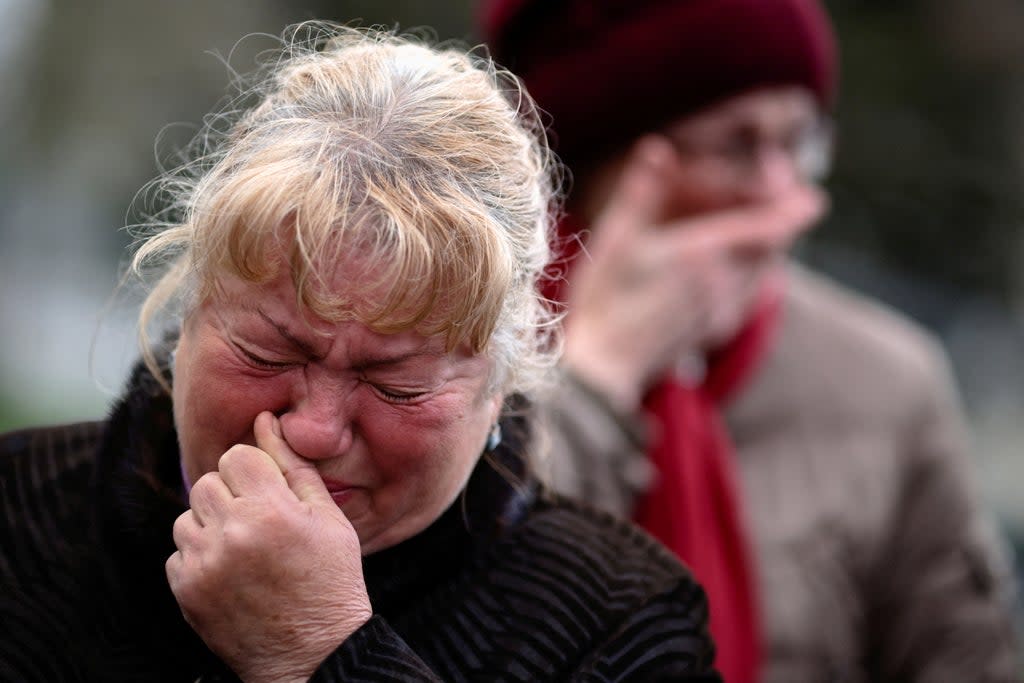
- Oops!Something went wrong.Please try again later.
All of a sudden, moving through Ukraine became a stumble through the sick dreamscape of your worst nightmare.
Under a railway station in the northern town of Trosytanets, where artillery has blasted suburban mundanity into a muddy moonscape, men emerged with their stories of being tortured for information they didn’t have.
In a quiet wood, over 350km (220 miles) west, near the capital Kyiv, we found the body of an unknown Ukrainian teenager, bound and shot, face down in the trees. He was just metres from a Russian trench camp where an abandoned cafetiere, chicken coop and pair of socks drying on trees spoke of a hasty retreat.
In Zaporizhzhya, the heart of the country, and an escape route out for those fleeing the besieged city of Mariupol, a woman whose legs were stuttered with shrapnel recalled watching her bed-ridden aunt burn to death because no one could get her to a bomb shelter in time.
In the southern city of Mykolaiv at a hospital, whose windows were boarded up, a doctor admitted one of his patients, who picked up an unexploded banned cluster munition bomblet, may never walk again.
All along an 8,500km odyssey through Ukraine, we stumbled across horrific stories. As Putin’s invasion grinds past the miserable milestone of two months they only get more bloody and more awful. These testimonies show that despite Moscow’s protestations of good faith and innocence, we have only just scratched the surface of the horrors that have already happened or are going on right now as I write this, and his forces turn their attention to the east.
“It was a nightmare – it was the worst thing they has ever happened to me and I worry it is happening again elsewhere,” said Dima, one of the civilians I spoke to who who survived several days of torture in Trostyanets. He is too gentle a person to shrug off the violence he was subjected to: his hands, numbed by torture, shook.
“I see their faces in my dreams. And I know it is not just me. Think what is happening as we talk, in Mariupol in Donetsk.”
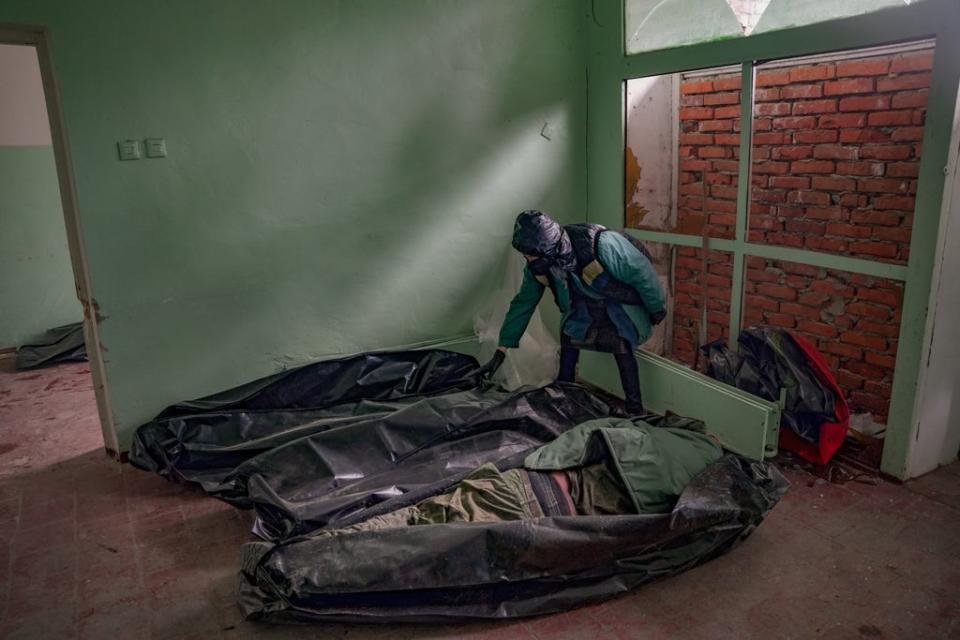
Yuri, 32, who was shot and tortured in a different basement by Russians several hundred kilometres away in a village north of Kyiv, is also worried about the others. He spoke to us from a hospital bed where doctors are trying to save his mangled foot.
“I feel like I was lucky to have survived as I did,” he told The Independent. “I met a guy who was kept captive for 20 days without light. He was pyschologically damaged. It even took some time for him to get used to the sunlight again. There are many like him,” he added.
We will likely never know the true scale of what has happened. We can get indications though. On Friday, Maxar Technologies published images showing mass graves so vast in Russian-occupied territory near Mariupol that they appear in satellite imagery.
The British Ministry of Defence had previously released footage of it says are mobile crematoriums “to evaporate” one human body at a time and so erase the worst crimes.
Meanwhile, President Putin who has focuses his forces on consolidating the east and south of Ukraine, dismissed this all as “monstrous forgery”.
But Dima shows the scars on his legs and wrists as evidence.
“It’s written on my body,” he added.
‘There were bits of corpses all over the ground’
“I realised I had a choice,” said 22-year party planner Marina, as she coordinated a makeshift conveyer belt of people making sandbags on the beach of the coastal city of Odesa.
“Either leave the country, sit at home and wait to die, or get out and do something.”
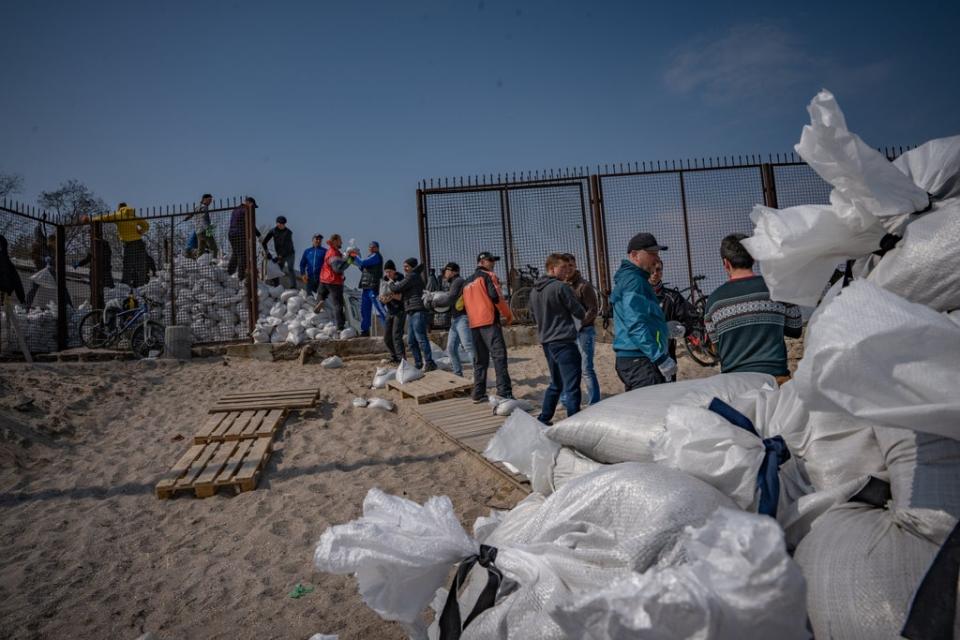
Against the soft whomp of outgoing anti-aircraft fire, hundreds of volunteers continue the back-breaking work of making over 10,000 sandbags a day which are sent across the country to reinforce buildings, bases, hospitals, monuments and schools. In the background a young drummer accompanied the Arctic Monkeys on a speaker and so the teams intermittently broke to dance.
As with all wars, this one begins with the present continuous of grief: a rollercoaster of hope and horror, resilience and despair as people go through the process of dealing with the ambush of a new past.
For many this immediately translated into rallying to the war effort.
I met grandmothers weaving military camouflage netting in community centres in the western city of Lviv, construction workers welding Czech hedgehogs in the central city of Khmelnytskyi, young fashion designers forging bulletproof vests out of truck springs in the port city of Mykolaiv, and party planners like Marina filling sandbags at the beach in Odesa.
In multiple towns there were queues around the block and waiting lists for people to join the army. Gyms and town halls across the country became civil and territorial defence training grounds for civilians, learning how to use everything from molotov cocktails to rifles.
And so the invasion rather than breaking spirit has had the adverse consequence of uniting the country.
At the bewildering number of checkpoints that now carve up the country, the repeated phrase “glory to Ukraine” has become synonymous with “hello”.
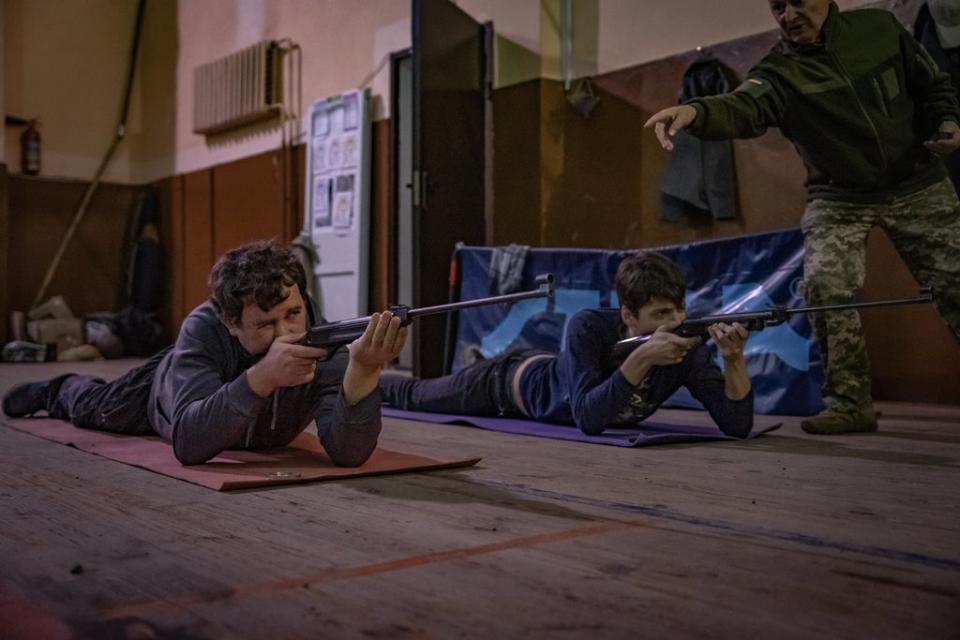
Homemade billboards telling the Russians to eff off back home (or to The Hague) litter the roads. As do ones glorifying particular strategic wins, or moments of bravery: “Russian ships, go f**k yourself”, the alleged battle cry of Ukrainian soldiers on Snake Island, is such a popular epigram it is now commemorated on Ukraine’s newest postal stamp.
And at the helm is populist President Volodymyr Zelensky, who with his 21st-century mix of Dancing with the Stars and battlefield videos, has one of the most recognisable faces of our time.
It is a truly modern conflict.
Homemade military hardware aside, Ukraine, a tech start-up nation famous for its call centres, harnessed that knowledge to help deal with the nightmarish consequences of war.
I met Ukrainian MP Halyna Yanchenko who, together with a team of computer programmers, launched the Prykhystok website – which is a bit like Airbnb or couch-surfing for refugees, as it maps 5,000 shelters across the country. Two of the developers then pivoted to partnering with car-sharing and taxi apps – the Ukrainian equivalents of Uber – to organise carpools and rides for civilians fleeing some of the worst conflict zones.
Someone else built an app that notifies you of every air raid siren, while others developed web-based programmes offering detailed maps of local bomb shelters and hospitals.
Across the country these resources became a lifeline for those forced to forge the new refugee trail.
At the railway stations, Second World War-like scenes of child evacuees layer over the technicolour nightmare of what was unfolding.
All roads ultimately culminate in the last gruelling stretch to countries like Poland or Romania, where I watched a stream of figures emerge ghostlike through the darkness, carrying their children and the pets and their hastily packed suitcases: the last quick summary of their former lives.
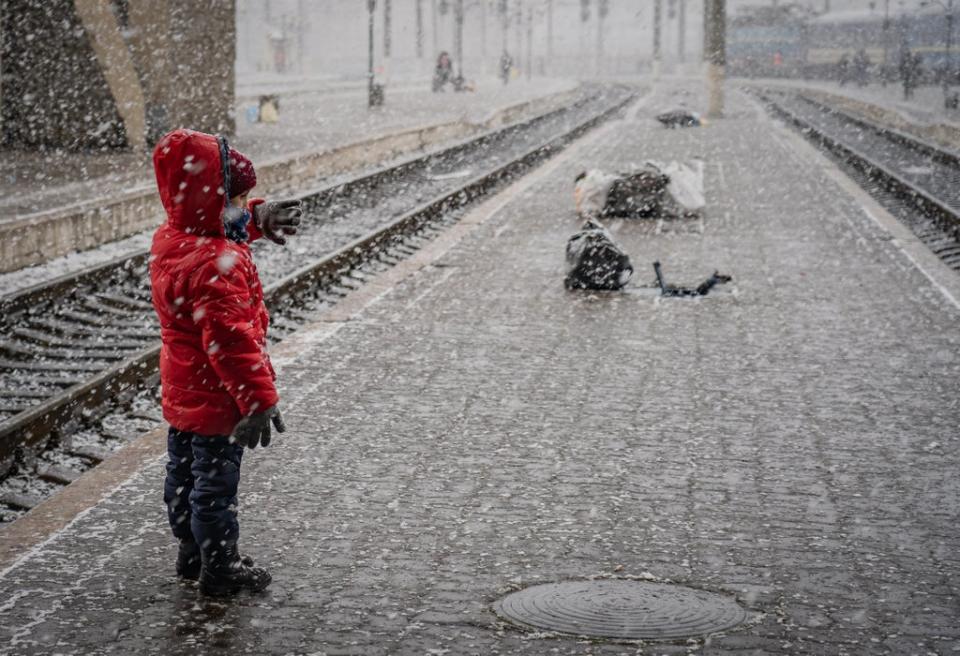
And through them we started to hear the drip-feed of horror, that we, as reporters, would eventually stumble into in areas liberated from Russian forces.
“A rocket hit a queue of people waiting for humanitarian aid, there were just bits of corpses all over the ground,” said Ruslan, 39, who escaped the besieged city of Mariupol with his wife and daughter to Zaporizhia.
He was forced to leave his mother, sister and stepfather behind because, by an unhappy coincidence of address, they lived on Mariupol’s left bank, the worst hit area of the city that has recently become a last stand. Right now hundreds of civilians – they may well include Ruslan’s family members – are holed up in the Azovstal steel factory on the left bank, with the last remaining, outgunned group of Ukrainian fighters.
“We lost contact with them after the first week of the war, and now...” he trails off.
Behind Ruslan was a white board of desperate messages from families like his asking for help trying to find or get to missing loved ones. It is just one of dozens of boards I saw in different shelters and meeting points across the country as well as hundreds of WhatsApp and Facebook groups built for that purpose.
And so divided families will be the lasting legacy of this war.
In Lviv, a few weeks earlier at a theatre, which the cast and backstage staff had turned into a makeshift shelter, I met Maxim, 43, from Dnipro. As a man of fighting age he cannot leave Ukraine and so was spending the last few moments with his children, before he said goodbye to them indefinitely.
“I try not to think about being separated,” he told me, quietly as his boys watched Sonic the Hedgehog. “I’m just trying to do the best I can with everything without panicking.”
‘I saw with my own eyes’
They have a kind of celebrity status among the civilians desperate to get their families trapped under the most ferocious bombardments of the war.
The volunteer drivers who go back into besieged places like Mariupol and Donetsk braving shelling, airstrikes and Russian soldiers to shuttle people out to comparatively safer towns like Zaporizhzhya.
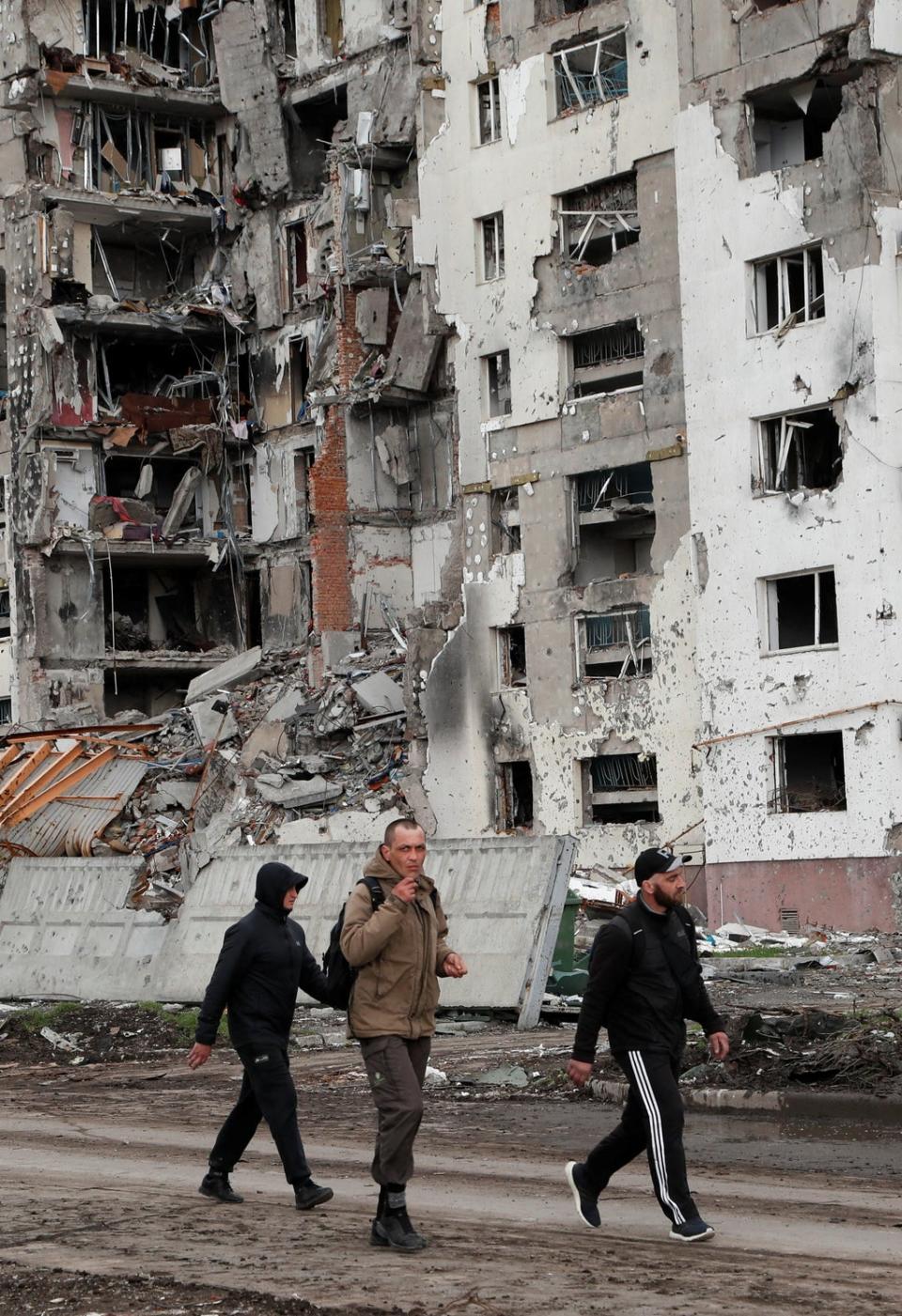
Three of the most well-known, who have made several trips back into Mariupol, are missing. Micha, who has apparently retrieved over 100 people, was last heard heading back to Mariupol before he vanished a few weeks ago.
This didn’t deter Andre, 42, who the day we spoke to him was joining a group of other cars to head to areas under bombardment in Donetsk now in the eye of Putin’s storm.
“I saw with my own eyes how the Russians fired on a Ukrainian Red Cross humanitarian aid convoy – there is no one else who can do this,” he said, while sticking a poster reading the word “children” in Russian on his car to protect against the worst onslaught.
“We planned to go to our house to find belongings and if we see anyone we will bring them back.”
Andre and the drivers was just one example of the extraordinary kindness of strangers across Ukraine during the journey as civilians have adjusted to the new normal.
In Hostomel, a few kilometres northwest of Kyiv, where unexploded rockets bristle the ground almost comically, I met Anna, 35, an accountant who had taken in a newly orphaned 11-year-old boy whose mother was shot dead by Russians in early March as she drove to get supplies.
Under fire they rescued the child, who was pinned under his mother’s dead body, and took him to their home while they spent weeks trying to find his father.
“We didn’t know who the family was, but the boy would write to his mother in his diary every day,” she said in tears.
Over 150km northeast, in Chernihiv, during a month long bitter siege and bombing, a local pizza chain sourced and fixed three generators as well as an industrial drill to dig a well, to provide water to thousands who were cut off.
“We also had to find a way to feed people,” said Igor, who manned the effort.
And so he said they pooled together resources across the city and, with the bridges bombed and roads into the city under fire, they smuggled in supplies via boat.
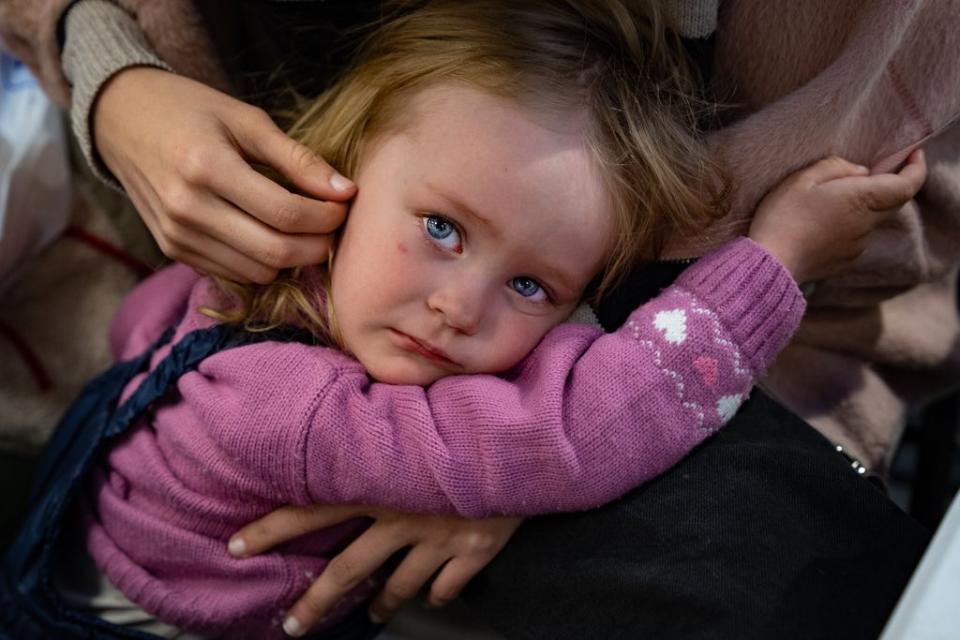
Civilians also helped journalists. One night in March, during an air raid and a snowstorm, a wedding venue provided shelter for a night.
Throughout the country, random families welcomed us as we stumbled into their bomb shelters.
Some even became our friends.
We were also welcomed into reception centres where - during one particularly heavy day a 9 year old boy who fled the front line in Zaporizhzhya taught me Russian via Google translate. He still messages me today to check in.
Back in Trostyanets, the resilience and kindness is partly why Anatoliy, a former soldier who came out of retirement for the war, thinks Ukraine will ultimately be victorious.
In 1986, he helped clear up after Chernobyl and has now survived a month-long Russian occupation of his home town. Twice an accidental witness to history, he thinks Putin’s war is far worse and more dangerous for Ukraine and Europe than the world’s most famous nuclear disaster.
He spoke as he took us around the trashed main administrative building of the town which had become the headquarters for Russian forces who have inexplicably left piles of excrement, smears of blood and half-drunk bottles of alcohol everywhere.
“Look at this, they are barbarians, we have to be victorious,” he added.
But there is no certainty to Anatoily’s belief, which is echoed by many Ukrainians. Western officials still think Russia might “win” this – telling British media last week that the Russian army outnumbers Ukrainian forces in the east by three to one and could even march on the capital again.
And so the predictions are that the future will be a bloody and long one. And in the interim families will be riven apart.
On the 13-hour train ride from Kyiv to Poland – the final leg out of the country – I watched the men accompanying their families start to drop off as carriages approached the final stop in Ukraine before the border.
“Look after your mother,” one father told his little girl as he waved goodbye. Possibly forever.
“I’ll see you soon,” he added, lying with love.

